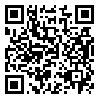Volume 13, Issue 2 (2022)
JHS 2022, 13(2): 277-300 |
Back to browse issues page
Download citation:
BibTeX | RIS | EndNote | Medlars | ProCite | Reference Manager | RefWorks
Send citation to:



BibTeX | RIS | EndNote | Medlars | ProCite | Reference Manager | RefWorks
Send citation to:
Shariati S, Faryabi A. Historical Sociology of Bad Governance in Iran
Content Analysis of the Living Experience of Iranian Economic Managers in the Second Pahlavi Period According to Harvard Oral History. JHS 2022; 13 (2) :277-300
URL: http://jhs.modares.ac.ir/article-25-46245-en.html
URL: http://jhs.modares.ac.ir/article-25-46245-en.html
1- Associate Professor of Political Sciences, Tarbiat Modares University , shariati@modares.ac.ir
2- M.A of Political Sciences, Tarbiat Modares University
2- M.A of Political Sciences, Tarbiat Modares University
Abstract: (2302 Views)
A review of the history of Iran's development in the second Pahlavi period shows that the country's economy was suffering from endless turmoil and the country's senior decision makers could not even properly identify these problems. Using the theories of Rentierism and Patrimonialism, this article has tried to show how in the process of formation of the modern state in Iran, a special way of governing based on political, economic and administrative corruption was formed. The article shows that the use of oil revenues in political economy and patriarchal relations in political culture led to bad governance in Iran. The main question of this article is about the most important causes of inefficiency of governance in the Pahlavi era? The research method in this article was to analyze the content of the lived experience of the managers of the Pahlavi period in accordance with the oral history of Harvard. The article shows that ignoring the basic requirements of modern governance and the constant weakening of institutions, political elites and social forces led to the inability and collapse of the Iranian political system.
Send email to the article author
| Rights and permissions | |
 |
This work is licensed under a Creative Commons Attribution-NonCommercial 4.0 International License. |










